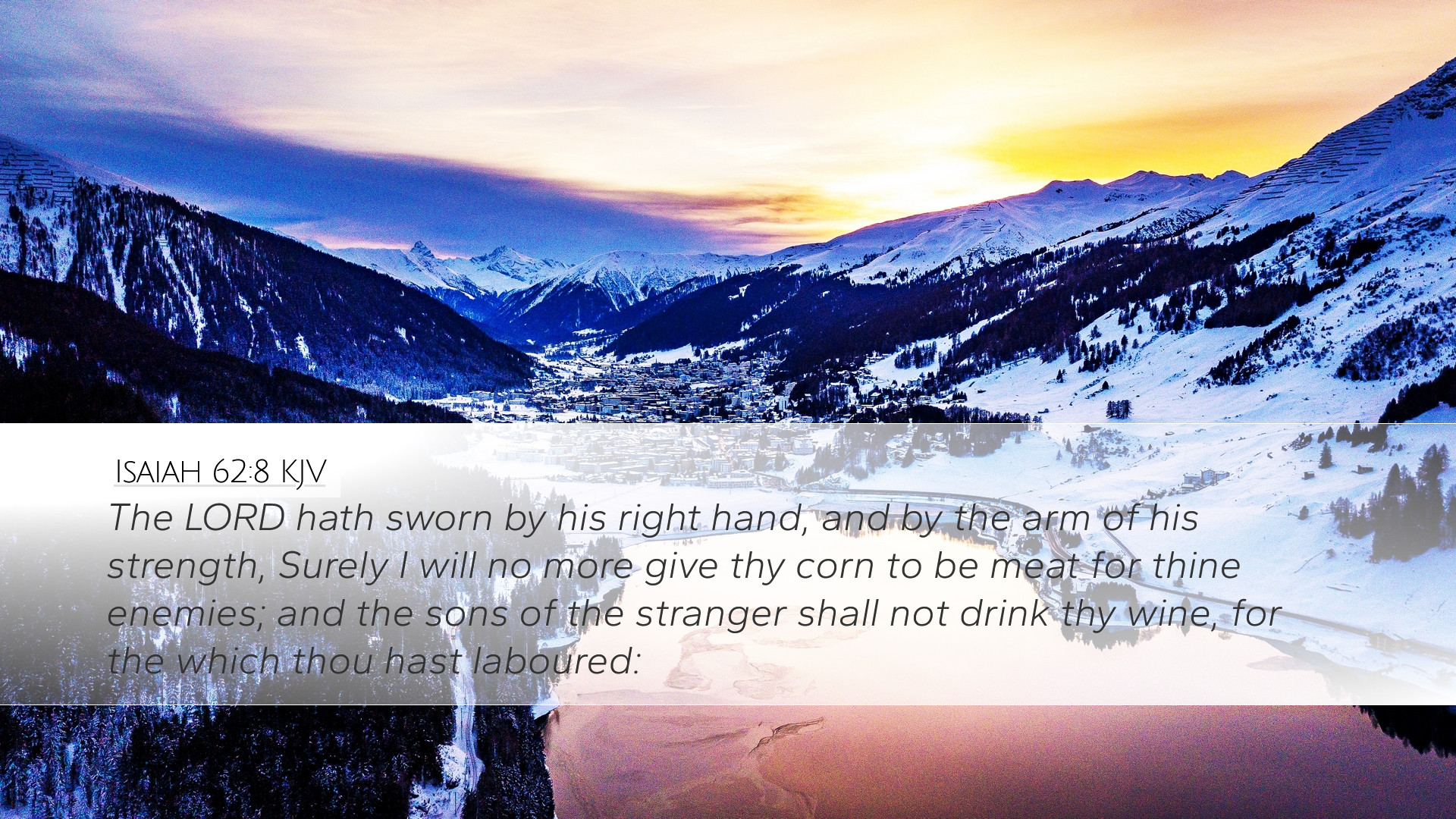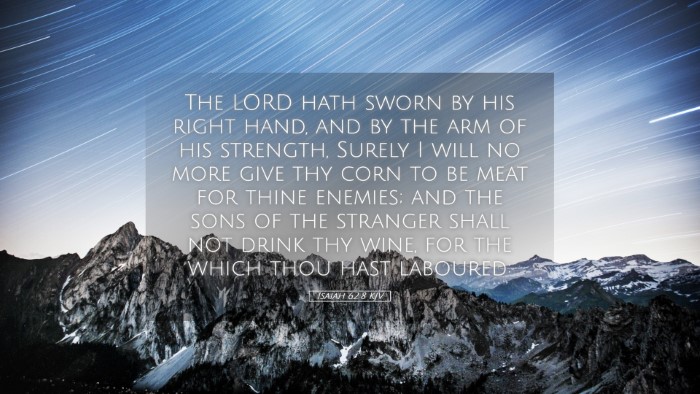Commentary on Isaiah 62:8
Isaiah 62:8 states, "The Lord has sworn by His right hand and by the arm of His strength, Surely I will no more give thy corn to be meat for thine enemies; and the sons of the stranger shall not drink thy wine, for the which thou hast labored." This passage encapsulates the promise of restoration and divine protection over God's people. The assurance of God's commitment to Israel represents His covenantal faithfulness and serves as a profound theological hallmark for believers today.
Divine Commitment and Assurance
Both Matthew Henry and Adam Clarke emphasize the significance of God’s oath in this verse. God’s swearing by His right hand symbolizes His authority and unbreakable commitment. The right hand, often associated with power and victory, underscores that God is not only willing but also able to fulfill His promises.
Contextual Background
This verse appears in a larger context where Isaiah proclaims messages of hope and restoration following periods of judgment and exile. The preceding chapters depict the mourning over Jerusalem and the promise of her redemption. Albert Barnes notes that the chapter signifies a transition from desolation to hope, presenting a renewed vision for Jerusalem under God's providential care.
Restoration of Prosperity
The promise that God will not allow enemies to consume what His people have labored for is a highlight of divine restoration. This statement carries significant weight regarding agricultural prosperity—a fundamental aspect of life in ancient Israel. Henry explains that God's assurance leads to the conclusion that all that His people sow and harvest will be safeguarded from foreign powers.
-
Protection Over Resources: The assurance of security over grain and wine signifies broader themes of protection over all resources that God's people depend on for survival and wellbeing.
-
Divine Recompense: God reverses the misfortunes of His people, ensuring that the fruits of their labor will be enjoyed by themselves rather than taken by outsiders.
-
Future Blessings: This promise of future blessings serves not only as comfort but also as motivation for ongoing faithfulness among the people of God.
Theological Implications
Theologically, this passage reflects the character of God as one who provides and protects. Clarke notes that the mention of “enemies” depicts the broader reality of spiritual warfare faced by believers. The assurance of God safeguarding His people’s resources is an affirmation of His sovereignty over their circumstances.
Hope Amidst Adversity
For pastors and theologians, Isaiah 62:8 reminds us that God’s faithfulness remains even when His people may feel abandoned or threatened. God's promises encourage believers to trust in His provision. The context of restoration found in Isaiah offers essential insights for preaching and teaching about hope and perseverance in faith.
Evidence of God’s Presence
Matthew Henry asserts that the presence of God is inherently tied to His blessings. The security of their labor demonstrates not only God's concern for their material needs but also His greater desire for their spiritual well-being. The act of removing the threat signifies God's hand at work, reminding the church today that our struggles are met by God’s powerful intervention.
Application for Today
The promise found in Isaiah 62:8 can be seen as an invitation to trust God with our labors and resources. Whether in church leadership, community outreach, or personal endeavors, this verse serves as a reminder that God values our work and provides avenues for fulfillment.
- Encouragement for Believers: Just as Israel expected restoration, Christians can claim the promise that God will protect their labor and efforts.
- Call to Faithfulness: The assurance in this verse inspires believers to maintain faithfulness and integrity in their work and relationships.
Conclusion
Isaiah 62:8 encapsulates God’s enduring commitment to His people and His authoritative promise of provision and protection. Through the insights gathered from public domain commentaries, it becomes evident that this verse invites reflection on God’s character and inspires trust among believers. The enduring relevance of this message can encourage us to embrace hope and faith in the face of challenges, with the assurance that what is sown in faith will be reaped in blessing.


